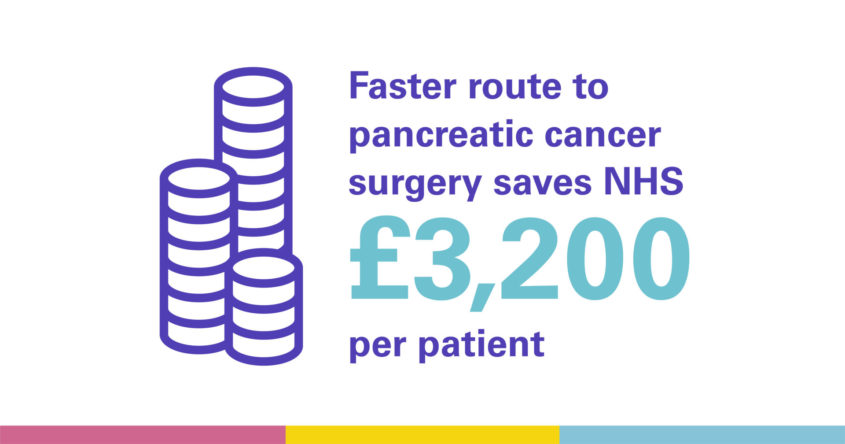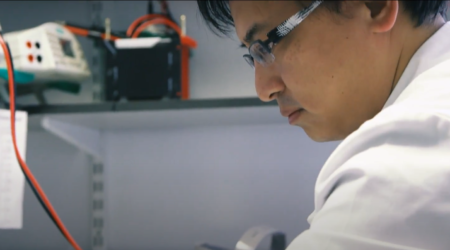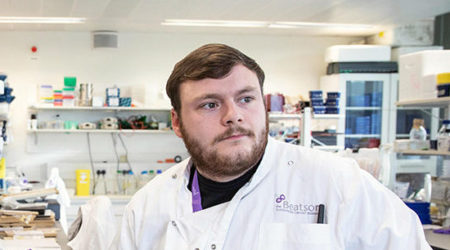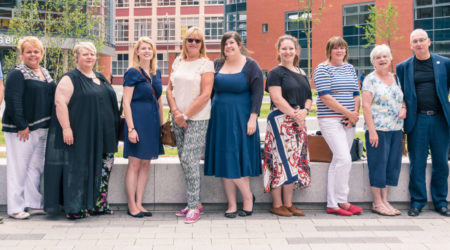

Clinical Pioneer Awards
Ensuring everyone affected by pancreatic cancer receives the best standard of care, treatment and support regardless of where they live in the UK
Read all about our research projects
We recently published a report showing that people living with and affected by pancreatic cancer experience unacceptable differences in the treatment and services they receive in different areas of the UK. The message of this report is clear – we need to dramatically change the patient experience of pancreatic cancer.
This is why we have established our Clinical Pioneer Awards scheme, funding innovative, practical approaches to improve survival rates and quality of life for people with pancreatic cancer. This includes ways to speed up diagnosis or treatment, improve patient experience, and deliver a more consistent standard of care. This initiative has already funded three projects that aim to make rapid improvements to the quality of NHS care, providing hope for people facing pancreatic cancer.
Case study: Fast track surgery model for pancreatic cancer
We funded a team in University Hospital Birmingham led by Consultant Hepatobiliary and Pancreatic Surgeon Keith Roberts, to develop a ground-breaking Fast Track Surgery Model.
The team worked with hospitals to speed up referrals for patients and reorganised the way surgery was carried out.
What were the outcomes of the work?
The team at the University Hospital Birmingham showed that through the fast track pathway people could receive surgery within just 16 days, rather than 65 days for those who first underwent stenting. Stenting is used to relieve jaundice before a patient can have surgery to remove the pancreatic tumour.
The fast track pathway leaves out the stenting procedure, which allows more people to receive surgery directly, avoiding complications associated with stenting and with a total cost saving of £3,200 per person for the NHS.
Through the pilot, it meant that 97 per cent of patients who were eligible for surgery went on to have the treatment successfully, compared to a current average of 75 per cent of eligible patients.
The savings to the NHS were made by cutting out the treatment for jaundice before surgery, as well as reducing complications and hospital readmissions after surgery.


Fast track surgery was the cornerstone of our Demand Faster Treatment campaign, which was backed by over 100,000 people showing the strong public support for faster treatment.
In 2019, the success of the fast track surgery model was recognised in the NICE Shared Learning Awards showing how innovative clinical pioneering work combined with a national campaign can start to change care and outcomes across the UK.
We have shown that it is possible to create a much faster path to surgery for pancreatic cancer patients within the NHS, which could have a significant impact on survival. I am now sharing the results of this far and wide.
Find out more about our Clinical Pioneer Award projects:
The PanDA project: Nutritional therapy when it is needed
Recipient: Professor Juan Valle
Host Institution: The Christie NHS Foundation Trust
Type of award: 2015 Clinical Pioneer Award
Funding: £103,880
About the study: The Pancreatic Cancer Dietary Assessment (PanDA) study focuses on giving patients nutritional therapy when it is needed. Pancreatic exocrine insufficiency (PEI), which is a common symptom of pancreatic cancer, occurs when a tumour prevents the pancreas from digesting food properly, and, if left untreated, can cause malnutrition and weight-loss. For patients with inoperable pancreatic cancer, PEI can be particularly devastating as it can prevent them from being fit enough to have life-extending chemotherapy.
Earlier research has suggested that pancreatic exocrine insufficiency replacement therapy (PERT) and nutritional support could help improve the outlook for pancreatic cancer patients after surgery. But its effectiveness in helping people withstand palliative chemotherapy has never been investigated before.
Through PanDA, researchers and clinicians at the Christie want to identify patients with advanced pancreatic cancer who are showing symptoms of PEI and what are the best tests to use to diagnose them sooner, so they can start treatment for their symptoms earlier. Researchers also want to observe the effects of nutritional therapy on their quality of life and their ability to undergo life-prolonging treatment.
If PERT and this nutritional therapy approach is shown to be effective, it could transform the way people with inoperable pancreatic cancer are treated. It could help them manage their symptoms better, be well enough for chemotherapy and spend precious extra time with their friends and family.
Enhanced recovery for patients who have had surgery
Recipient: Mr Keith Roberts
Host Institution: University Hospitals Birmingham NHS Foundation Trust
Type of award: 2016/17 Clinical Pioneer Award
Funding: £50,000
About the study: Mr Keith Roberts, a Consultant Surgeon in Birmingham, is carrying out research to ensure that every patient is receiving the best care after having surgery. He hopes this will provide people with the support they need so they can recover quickly and return to full health.
What is current care like for patients after surgery?Surgery to remove pancreatic cancer is a major operation. Patients will need to be fit enough to have it, and it can affect people emotionally as well as physically. This means that following surgery people often need lots of support and often further treatment, for example pain relief, physiotherapy and chemotherapy
Research has shown that the earlier a person gets out of bed and starts walking, eating and drinking after an operation, the shorter their recovery time will be. Therefore the right treatment and support after surgery will help patients to get fit, and return to living a healthy life with their loved ones.
There are many reasons why patients might currently not be getting the care and support they need after surgery. This could include patient age or frailty, early cancer recurrence or even a perceived lack of benefit of further treatment by doctors.
We want to see a world where everyone affected by pancreatic cancer receives the best standard of care, treatment and support. We want this world to be a reality to improve survival rates, and lengthen and improve lives.
What is this project aiming to do?
The aims of the project will be to:
- speed up recovery and reduce length of hospital stay
- improve patient experience of every aspect of the recovery pathway
- reduce complications and re-admissions to hospital
- get buy-in and engagement from health professionals
- and, ultimately improve patient outcomes.
What will this project actually involve? Patients who take part in this study will be enrolled into an enhanced recovery programme. Firstly, patients will be taken into the care of a dedicated Enhanced Recovery Nurse, who will be responsible for assessing what support and care is needed at the hospital post-surgery. This will include looking at pain relief, nutritional advice and support, emotional support, and physical support, and deciding what might be needed for each individual patient.
Patients will also be referred to a dedicated Physiotherapist who will enrol them into an intensive physiotherapy programme. This will include remote monitoring made possible using ‘Fitbit’ technology.
Finally, before discharge patients will be subject to a further review of their emotional and physical needs. This will allow the medical team to identify additional support that will be needed after a patient leaves hospital, which will be passed onto geriatricians and oncologists at their local hospital.
To make this pathway work, Mr Roberts and his team will develop and engage with a network of geriatricians and oncologists in local hospitals. It is these specialists on the ground who be essential in ensuring that every patient gets the individual care and treatment they need to recover quickly and get back to full health.
We hope that through our continued funding Mr Roberts will be able to have the same impact for patients who have had surgery, seeing them recover quickly and continue living well with their families and loved ones.
Your support will help us fund ground-breaking projects like these. Please donate today.




